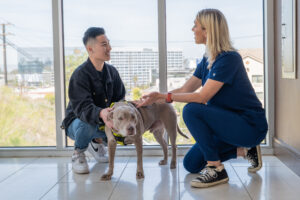The Great Veterinary Shortage and How to Survive It
by: Camille Virtucio, DVM
Fully booked clinics.
Hours of waiting time.
Phone calls just go straight to voicemail.
You are on hold for more than 20 minutes.
It takes weeks before you hear a follow-up on lab results.

This is the current status of the veterinary industry.
It is not a secret that there is a great veterinary workforce shortage (both veterinarian, technicians and receptionists) looming over us right now. By 2030, it is expected that 75M pets will have no access to veterinary care. This is mainly caused by more and more households adopting pets, while the veterinary personnel supply is not producing enough.
Right now, there are 18 job openings for each veterinarian – meaning, for every job a vet will take, 17 slots are left without a vet. Every year, there are only 2,000-2,600 vets graduating and this is not enough to supply the demand. Vet school average tuition debts are averaging $300,000 and young veterinarians are exploited to take more cases due to demand, but with the same compensation. More experienced vets, the baby boomer generation are retiring early due to the challenges of the job; and there is not enough time to mentor the younger vets due to slammed schedules. Suicide rates in the veterinary field are notoriously high – twice of the dental profession, more than twice of the human medical profession, and 4x the rate of the general population.
The pressure is real and it is still going to get worse.
Efforts are being put into place to have this under control. However, it will not be easy. I honestly think it will be very difficult to address this issue and we all just need to survive this era.
So I decided to make an article for you, my lovely clients to help and protect you from this impending challenge. There are some ways to go around the system and survive – to make sure that you and your furbaby will stay protected and still get the best care for years to come until leaders in the industry figure out how to solve this.
So how do you protect yourself, your pet, and your wallet from all of these?
- Get pet insurance.
-
- Veterinary services are not going to get cheaper. My honest-to-goodness observation is this: Pets with medical insurance tend to get better (if not the best) care – owners are more willing to work with the care team and vets have more options to exhaust in helping a pet out. We can run diagnostics and more sophisticated testing when our clients are supported by insurance. We can get more answers and offer better treatment. As I always say, we are not just “band-aiding” the situation. We tend to get answers.
-

Insurance
- Laboratory prices are increasing every year. Good and effective medications and treatments backed by research have skyrocketed in high prices due to capitalism. As technology advances, and with the current inflation, there is no way to go up. That is the truth of the matter.
-
- If an emergency happens, there will be no hesitation to go to an emergency out of fear of costs. Emergency visits can range from $1000-$5000+++. Some emergency hospitals even charge more when it’s out of office hours.
- Go to pawlicy.com and see all available pet insurance available for you.
2. Establish and maintain a good relationship with a clinic or veterinarian.

-
- Know the difference between an emergency veterinarian vs a general practitioner. Some owners think that all vets are “on call” and expect a quick response from the vet care team.
-
- MY TIP: If you need an immediate answer and help as soon as possible, go to an emergency hospital, call pet poison hotlines, or download apps that have access to a 24/7 vet. These are your “go-to’s” and you can get quick answers. If we say we are not available, then we actually are not available. Simple as that. We are not being lazy and not that we don’t care – we just do not have the manpower to attend to you.
-
- Find a vet or a tech that will fight for your pet behind closed doors, and just like any relationship, take care of it. This happens A LOT and it is very beautiful to see. If you are nice to us and treat us with respect, we will go well and beyond for you. We like helping you. But if you are demanding, and disrespectful and expect that we are at your “beck and call”, then we will avoid you. We do not say it, but you will feel it. I do not speak for all vets and clinics, but generally, that is the truth. Toxic behavior pushes us away.
-
- If we did a good job, let us know. If there is something we can improve, also let us know in a respectful way. Kind words keep us sane.
-
- I know that giving tips is taboo in the industry, but I do think technicians and receptionists deserve them. We are still a service industry that deals with poop, pee, anal glands, and vomitus. We roll on the floor to hold your pets and we get our scrubs and hair covered with blood and body fluids. Making your technician feel appreciated goes a long way. They become your allies. They can make things happen for you in this very much slammed industry. So be kind. Show gratitude. I am pretty sure you’ll get it back :)
3. Know the hierarchy of veterinary care and how to access them.
General practitioners:
This can range from new graduates to more seasoned veterinarians who are your first line of care. These vets function on an appointment basis. If you need to talk to one, secure an appointment so you will get their full attention and their time is blocked off for you. Instead of asking for a callback asap (we all don’t know when this is going to happen), set up a phone or an in-person recheck appointment. We will appreciate this more.
Emergency practitioners and criticalists:
These are veterinarians trained to see emergency situations and can give immediate care to pets in distress. These vets carry a big responsibility of saving pets’ lives and are also slammed with back-to-back cases. With the current situation, most don’t have much support staff as veterinary staff turnover rates are really high nowadays. If your pet can be referred by your main vet to an emergency facility, most often, you will be prioritized. If they deem that your pet is not experiencing an emergency, some facilities will not accept you.
Again, these places can only accept real emergencies. Once an animal is stabilized by the emergency veterinarians, and the case gets referred to a specialist.
Specialists:
There are veterinarians who have undergone further training of many years in a specialized field such as surgery, Opthalmology, internal medicine, cardiology, dermatology, dentistry, neurology, oncology, and behavioral medicine. General practitioners will refer cases to these specialists if the case isn’t responding to general treatment and/or will need higher level care and diagnostics. Most visits to specialists will entail higher costs and having pet insurance will really help with this level of care.
4. Veterinary TeleHealth
-
- These apps are available for download and you can pay monthly or per consultation. These are very good resources especially if your pet has a chronic health issue that can lead to an emergency. These vets are trained to give you quick answers and refer you to the proper care. Most of them cannot prescribe medications as there are state laws regarding that, but having a veterinarian hear you out and triage the problem – look at photos and videos of the issue, can give you peace of mind and a sigh of relief.



-
- TeleVet, Pawp, PetDesk, AskVet, Vet Triage, so much more! Just Google search and you will find lots of options.
5. Keep organized records of your pet’s health. Make it easier for your vet to help you.

-
- Once you have an appointment, organize your records so it will be easier for us to make an overall impression of your pet’s health and recommend the necessary treatments/diagnostics.
- Be honest when telling us the history. Avoid sugarcoating or downplaying the problem. If there are financial limitations, communicate with us. We are only as good as what you tell us. Our patients cannot talk, so whatever you provide to us is very vital to job we do.
- Take photos and videos so you can self-monitor your pet’s clinical signs. Show these to us as needed.
- I have so much appreciation of pet owners who present their pets’ problems to me like a school project. It really helps tweak my brain into offering the proper care. Nothing gets missed out and miscommunication is avoided. I feel inspired to help them more.
We are not a perfect industry, but if there is something I can tell you – we are all trying our best. We all have ways and maybe other doctors and clinics do it differently, but we are all stuck in a system that is in major crunch time.
My goal in writing this is to help you and equip you with the right mindset and resources so you can make sure that your pets get good quality medicine and a high level of care – which they all very much deserve. :)


